
Charles Laughton was a British-American actor. He was trained in London at the Royal Academy of Dramatic Art and first appeared professionally on the stage in 1926. In 1927, he was cast in a play with his future wife Elsa Lanchester, with whom he lived and worked until his death.

Sister Kenny is a 1946 American biographical film about Sister Elizabeth Kenny, an Australian bush nurse, who fought to help people who suffered from polio, despite opposition from the medical establishment. The film stars Rosalind Russell, Alexander Knox, and Philip Merivale.
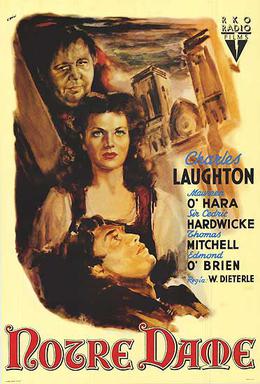
The Hunchback of Notre Dame is a 1939 American romantic drama film starring Charles Laughton and Maureen O'Hara. Directed by William Dieterle and produced by Pandro S. Berman, the film is based on Victor Hugo's 1831 novel. The film is also noted for being the first film ever shown at the Cannes Film Festival before the rest of the festival was cancelled due to the start of World War II.

Charles Drake was an American actor.
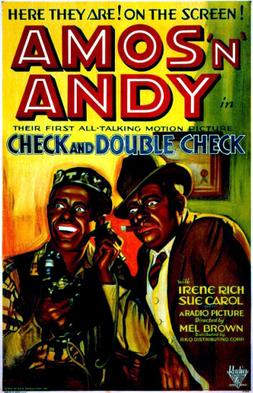
Check and Double Check is a 1930 American pre-Code comedy film produced and released by RKO Radio Pictures, based on the Amos 'n' Andy radio show. The title was derived from a catchphrase associated with the show. Directed by Melville W. Brown, from a screenplay by Bert Kalmar, J. Walter Ruben, and Harry Ruby, it starred Freeman Gosden and Charles Correll in blackface, in the roles of Amos Jones and Andy Brown, respectively, which they had created for the radio show. The film also featured Duke Ellington and his Cotton Club Orchestra.

Jon Hall was an American film actor known for playing a variety of adventurous roles, as in 1937's The Hurricane, and later when contracted to Universal Pictures, including Invisible Agent and The Invisible Man's Revenge and six films he made with Maria Montez. He was also known to 1950s fans as the creator and star of the Ramar of the Jungle television series which ran from 1952 to 1954. Hall directed and starred in two 1960s sci-fi films in his later years, The Beach Girls and the Monster (1965) and The Navy vs. the Night Monsters (1966).

Night of the Demon is a 1957 British horror film directed by Jacques Tourneur and starring Dana Andrews, Peggy Cummins and Niall MacGinnis. It was produced by Hal E. Chester and Frank Bevis, and was adapted from the M. R. James story "Casting the Runes". The film's storyline concerns an American psychologist (Andrews) who travels to England to investigate a satanic cult suspected in more than one death.

The First Traveling Saleslady is a 1956 American western comedy film directed by Arthur Lubin and starring Ginger Rogers, Carol Channing and Barry Nelson. Commercially unsuccessful, it was among the films that helped to close the already struggling RKO Pictures. Future western stars Clint Eastwood and James Arness have supporting roles in the film.

Mutiny on the Bounty is a 1935 Metro-Goldwyn-Mayer drama film directed by Frank Lloyd and starring Charles Laughton and Clark Gable, based on the 1932 Charles Nordhoff and James Norman Hall novel Mutiny on the Bounty. Despite historical inaccuracies, the film was a huge box office success, becoming the highest-grossing film of 1935 and one of MGM's biggest hits of the 1930s. The film received a leading eight nominations at the 8th Academy Awards, winning only Best Picture.
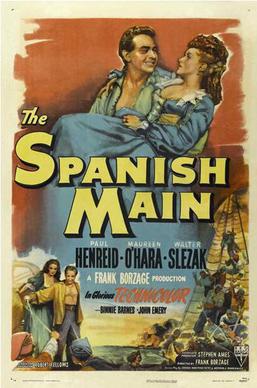
The Spanish Main is a 1945 American adventure film starring Paul Henreid, Maureen O'Hara, Walter Slezak and Binnie Barnes, and directed by Frank Borzage. It was RKO's first all-Technicolor film since Becky Sharp ten years before.

Curt Bois was a German actor with a career spanning over 80 years. He is best remembered for his performances as the pickpocket in Casablanca (1942) and the poet Homer in Wings of Desire (1987).
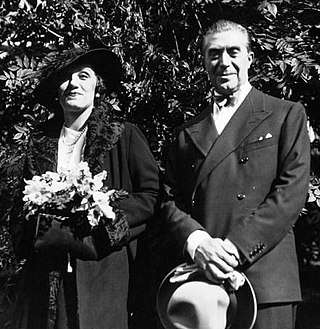
Victor Francen was a Belgian-born actor with a long career in French cinema and in Hollywood.
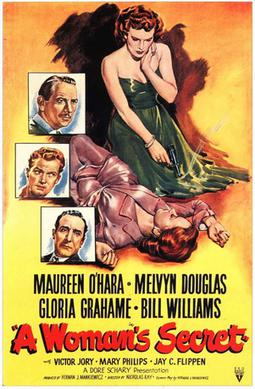
A Woman's Secret is a 1949 American film noir directed by Nicholas Ray and starring Maureen O'Hara, Gloria Grahame and Melvyn Douglas. The film was based on the novel Mortgage on Life by Vicki Baum.
Peggy Drake, was an Austrian born American film and television actress. She primarily appeared in B-movies of the 1940s.

Millie is a 1931 American pre-Code drama film directed by John Francis Dillon from a screenplay by Charles Kenyon and Ralph Morgan, based on a novel of the same name by Donald Henderson Clarke. The film was an independent production by Charles R. Rogers, distributed by RKO Radio Pictures, after their acquisition of Pathé Exchange. It stars Helen Twelvetrees in one of her best roles, with a supporting cast that includes Lilyan Tashman, James Hall, Joan Blondell, John Halliday and Anita Louise.
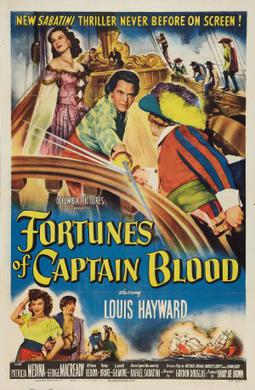
Fortunes of Captain Blood is a 1950 pirate film directed by Gordon Douglas. Based on the famous Captain Blood depicted in the original 1922 novel and subsequent collections of stories written by Rafael Sabatini, Fortunes was produced by Columbia Pictures as yet another remake about the notorious swashbuckler.

Zis Boom Bah, also known as College Sweethearts, is a 1941 American musical comedy film directed by William Nigh, and starring Grace Hayes, Peter Lind Hayes and Mary Healy. The plot concerns a vaudeville singer who comes to a floundering college to instill values and self-confidence in its entitled students.

To Dorothy a Son is a black and white 1954 British gentle comedy film in the form of a farce directed by Muriel Box and starring Shelley Winters, John Gregson and Peggy Cummins. Known in the U.S. as Cash on Delivery, it is based on the 1950 play To Dorothy, a Son by Roger MacDougall which had enjoyed a lengthy run in the West End. It was shot at Elstree Studios near London with sets designed by the art director George Provis. It was distributed in America by RKO Pictures in January 1956.

RKO Radio Pictures Inc., commonly known as RKO Pictures or simply RKO, was an American film production and distribution company, one of the "Big Five" film studios of Hollywood's Golden Age. The business was formed after the Keith-Albee-Orpheum theater chain and Joseph P. Kennedy's Film Booking Offices of America studio were brought together under the control of the Radio Corporation of America (RCA) in October 1928. RCA executive David Sarnoff engineered the merger to create a market for the company's sound-on-film technology, RCA Photophone, and in early 1929 production began under the RKO name. Two years later, another Kennedy concern, the Pathé studio, was folded into the operation. By the mid-1940s, RKO was controlled by investor Floyd Odlum.

Beau Bandit is a 1930 American Pre-Code Western film, directed by Lambert Hillyer, from a screenplay by Wallace Smith, based on his short story, "Strictly Business" which appeared in the April 1929 edition of Hearst's International-Cosmopolitan. The film starred Rod La Rocque, Mitchell Lewis, Doris Kenyon, and Walter Long. The story is based loosely on the legend of Robin Hood.



















